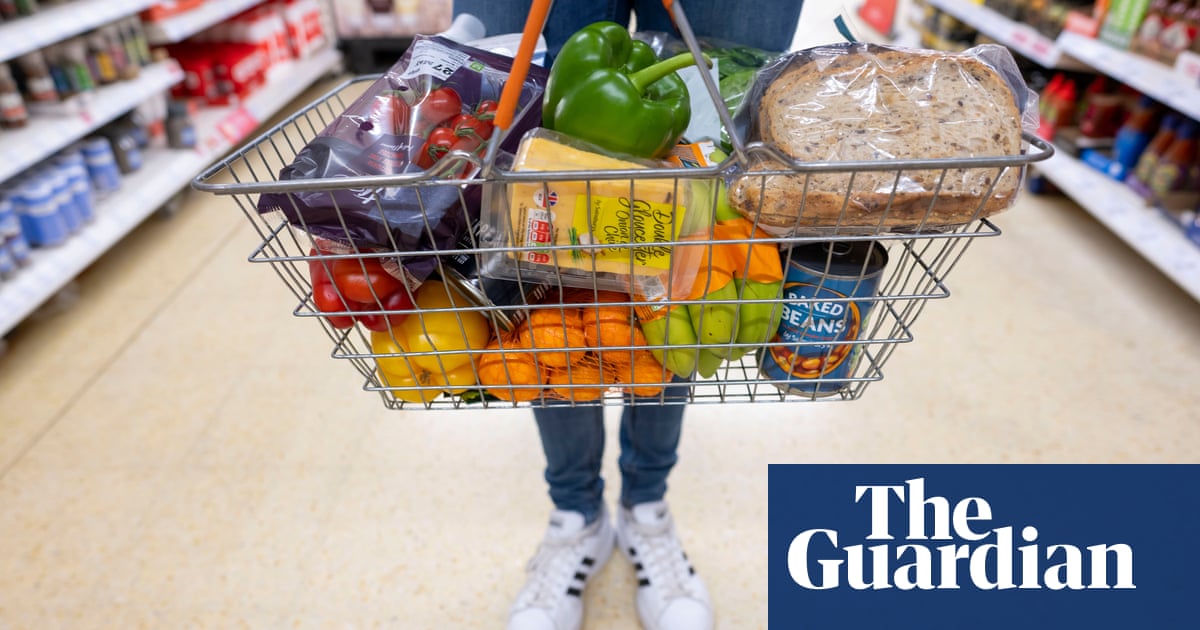
The Tesco boss has warned ‘the worst is yet to come’ – here’s what the big chains are doing to fight it
A customer browses the fruit and vegetable aisle in a Tesco Metro store
A customer browses the fruit and vegetable aisle in a Tesco Metro store. Photograph: Bloomberg/Getty Images
Sarah Butler
@whatbutlersaw
Tue 8 Feb 2022 06.00 GMT
The worsening cost of living crisis has focused attention on the cost of the weekly shop. Households already grappling with rising energy bills, petrol prices, tax, mortgage payments and rent can also expect to pay more for groceries this year.
At the weekend, the chair of the UK’s biggest supermarket chain, Tesco, warned “the worst is yet to come” for food price inflation, forecasting it would soon hit 5%.
Supermarkets are managing their own inflationary pressures, facing soaring bills for basic commodities, from coffee beans to milk and wheat, alongside rising packaging, transport, energy and staff costs.
Customer shops in Tesco
Tesco chairman warns of food price inflation at 5% by spring
Read more
Yet in the fiercely competitive UK grocery sector, if they do not do all they can to keep a lid on price rises, they risk losing customers to rivals, including the fast-growing discounters Aldi and Lidl.
So what kind of ammunition do supermarkets have to fight this price war, and what are they doing to limit increases on popular items while protecting profits?
Cutting staff costs
Payroll costs are in the spotlight. Brexit and the pandemic have disrupted the UK employment market, forcing retailers to offer wage incentives to fill vacancies. The legal minimum wage for those aged 23 or older also rises 6.6% to £9.50 in April.
Tesco announced more than 1,600 job cuts last week, cutting back on night shifts and closing more deli and meat counters to concentrate staff on other, more profitable, shopfloor jobs. Sainsbury’s and Asda have also cut back on fresh food counters.
A deli counter employee spreads tomato sauce on fresh pizzas at a Tesco Extra supermarket in Watford
Tesco is to close more deli and meat counters to concentrate staff on other, more profitable tasks. Photograph: Suzanne Plunkett/Reuters
Management roles, which like night shifts offer higher wages, are also being axed, along with staff benefits such as paid breaks and extra pay for Sundays or bank holidays.
Other tactics to reduce staff costs include more automation, with self-service checkouts extended to shoppers with large trolleys in some stores, and incentivising shoppers to switch to self-scanning systems such as Sainsbury’s SmartShop or Tesco’s Scan as you Shop. Asda is testing automated facial recognition at self checkouts to judge shoppers’ age for purchases of restricted products such as alcohol.
Behind the scenes, retailers are also looking at more automation in warehouses and stock rooms. Tesco is planning at least 25 robot-aided online grocery packing sites in the back of stores, while Ocado is developing a robotic system that will reduce the need for humans to pack bags or stack crates of groceries ready for delivery vans.
A technician prepares a “Bot” to be returned to the “smart platform” at the Ocado Customer Fulfilment Centre in Andover
Ocado is developing a robotic system that will reduce the need for humans to pack bags. Photograph: Peter Nicholls/Reuters
Squeezing suppliers
The regular battles between supermarkets and those providing their produce have stepped up this year as manufacturers and farmers try to pass on rising costs.
Advertisement
The groceries code adjudicator, Mark White, who oversees relations between the big supermarkets and their suppliers, has warned retailers against demanding that manufacturers give them fixed notice of price changes or other unfair practices.
In a tough market, Ged Futter of the consultancy The Retail Mind, which advises many suppliers, says he has seen numerous foodmakers temporarily stop supply to nearly all the supermarkets as battles over price rises have escalated. Until recently he had only seen isolated instances of such practice.
“They have got to a point where they have had to stop the trucks as they cannot afford to manufacture at those prices because the level of cost increases is so high. One of my clients’ packaging costs have gone up by 60%,” Futter said.
“I’ve been training suppliers for seven years and working in grocery retail for 22 years and there has never been a time like this. The level of inflation is above 10%, it’s unprecedented.”
Packet of KP dry roasted peanuts
KP peanuts are now 225g instead of 250g for £2.50. Photograph: studiomode/Alamy
Shrinkflation and mitigation
Watch out for supermarkets cutting the size of your ready meal, packet of mushrooms or bag of apples as they try to offset cost increases by providing a little less for the same price.
Their suppliers are also adopting shrinkflation tactics. Walkers has cut two bags of crisps from its 24-bag multipacks while the price stayed at £3.50. KP peanuts are now 225g instead of 250g for £2.50.
Sign up to the daily Business Today email or follow Guardian Business on Twitter at @BusinessDesk
Bryan Roberts, a retail analyst at the consultancy Shopfloor Insights, says own-label goods are likely to be a prime candidate for changes because they are not easy to compare with the previous week or to rival stores. “You have to be a very diligent shopper, or journalist, to monitor different lasagnes,” he said.
Removing more expensiveingredients – such as butter – from pre-prepared food and reducing the size of packaging are also cost-cutting options.
Other tactics include reducing the frequency of store deliveries and changing how or where food is produced or ingredients sourced in order to save costs.
Newspapers at Waitrose
Waitrose is to stop offering free newspapers to its loyalty card holders. Photograph: Guy Bell/Rex/Shutterstock
Cutting the extras
Retailers are focusing their resources on keeping prices low on key items and ditching less profitable or popular lines.
Tesco last week removed CDs and DVDs from stores, after a similar move by Sainsbury’s, while Waitrose is stopping handing out free newspapers to its loyalty card holders, offering discounts on their favourite items instead.
Efficiency, efficiency
When staff costs are high, retailers look at ways to reduce the time it takes to do work in the store so that they don’t require such a large workforce. Look out for more shelf-ready packaging and gravity-fed shelving, with which goods are fed in at the back and move forward on tilted rollers when an item is removed.
Shifting to electric vehicles, cargo bikes and trains – as already done by Tesco – is also likely to become more common as retailers try to reduce reliance on fossil fuels and HGV drivers, while also meeting carbon reduction targets.
Tesco electric vehicle
Tesco uses electric vehicles for much of its delivery fleet. Photograph: Maureen McLean/Rex/Shutterstock
Stopping the shrinkage
As pressure on household budgets increases, retailers say anecdotally they have seen a rise in shoplifting, known in the business as “shrinkage”.
Experts have already spotted new measures to counteract stock loss including putting vulnerable products – even chocolate bars – in locked plastic boxes and only displaying cardboard cutouts or empty boxes of goods that tend to be targeted by thieves so that the real thing must be collected at the till.












